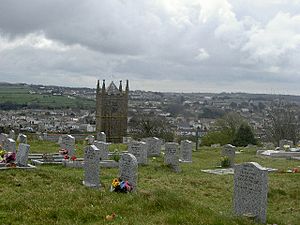St Felicitas and St Piala's Church, Phillack facts for kids
Quick facts for kids St Felicitas and St Piala’s Church, Phillack |
|
|---|---|

St Felicitas and St Piala’s Church, Phillack
|
|
| 50°11′46.63″N 5°24′52.48″W / 50.1962861°N 5.4145778°W | |
| Location | Phillack |
| Country | England |
| Denomination | Church of England |
| History | |
| Dedication | St Felicitas and St Piala |
| Administration | |
| Parish | Phillack |
| Deanery | Penwith |
| Archdeaconry | Cornwall |
| Diocese | Diocese of Truro |
| Province | Province of Canterbury |
St Felicitas and St Piala’s Church in Phillack is a special old church in Cornwall, England. It's part of the Church of England and is considered a very important historical building. It is known as a Grade II* listed building.
The Church's Story
This church is very old! It was first built way back in the 1100s (the 12th century). The tall tower you see was added later, in the 1400s (the 15th century).
The church got a big makeover between 1856 and 1857. An architect named William White helped rebuild it. After the work was done, the church was officially opened again on May 12, 1857.
Working Together: The Parish
A 'parish' is like a local area that a church serves. St Felicitas and St Piala’s Church is part of a 'joint parish.' This means it works together with a few other churches in nearby towns. These churches are:
- St Erth's Church, St Erth
- St Gwinear’s Church, Gwinear
- St Elwyn's Church, Hayle
- St Gothian's Church, Gwithian
The Church Organ
Inside the church, there's a beautiful pipe organ. It was made in 1905 by a company called Heard and Son from Truro. You can find more details about this organ on the National Pipe Organ Register.
 | Ernest Everett Just |
 | Mary Jackson |
 | Emmett Chappelle |
 | Marie Maynard Daly |

